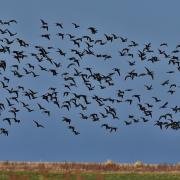Even in a rural county such as Norfolk, it is easy to lose connection with nature, writes Keiron Pim. Now a pioneering project is using our beautiful surroundings to help people experiencing poor mental health to find new meaning in their lives.
In Norfolk we have the beauty of the natural world all around us, from woodlands to idyllic water meadows and precious coastal habitats. Whether it’s rare butterflies or birds of prey, ancient oaks or carpets of bluebells in spring, the riches of nature are at our fingertips.
We also have rates of poor mental health above the national average. One in seven people in Norfolk lives with depression or anxiety. And in our urban areas it is easy to feel cut off from nature if reaching the countryside requires a car or bus journey.
Now a groundbreaking project by a Norfolk charity is using the natural world to help people who are struggling with their mental health, and it is achieving remarkable results.
The Nature Connect scheme run by Norfolk and Waveney Mind has seen regular group activities held in three urban locations – Norwich, King’s Lynn and Great Yarmouth – to help adults deepen their engagement with everyday nature, improving their emotional resilience and developing meaning and connection in their lives.
The project has included nature-based arts workshops, foraging, growing and house-planting sessions, mindful walking and forest bathing, among other activities. Forest bathing has been a hugely popular addition to the programme, explains project manager Ruth Taylor, of Norfolk and Waveney Mind.
‘We have led monthly sessions and a more intensive programme over the summer at the new and very beautiful Sweetbriar Nature Reserve in Norwich, which was exclusively accessed as it is not yet open to the public,’ she says.
‘This was via our developing partnership with Norfolk Wildlife Trust. This has even led to a peer group developing where we are training up participants to lead their own groups. We have just heard we have funding from Natural England to extend this to more participants, as well as to set up nature-walking wellbeing groups. Healthcare professionals such as GPs and nurses can then recommend these when making green ‘social prescription’ referrals – that is, when they take a holistic approach and recommend patients to try local, non-clinical services.’
The Nature Connect project is targeted at people aged over 18 with, or at risk of, mild to moderate mental health conditions. Since it began in 2021, around 150 people across Norfolk have taken part and now they are starting to see real results. Participants have reported marked changes to their wellbeing, emotional resilience and ability to cope with life’s challenges. A study compiled in 2023 asked if their wellbeing had improved by being connected with nature, and 100 per cent of respondents agreed, 62.5% of them strongly. Further to this,
· 86 per cent felt more confident to get involved with their community
· 80 per cent felt better able to cope with challenges
· 73 per cent felt more closely connected to their peers
· and 89 per cent knew how to get support if things were not going well.

So why has connecting with nature had such a powerful effect on the participants’ mental health? Ruth says it is the richness rather than duration of their time in nature that makes the difference. ‘Having a core set of principles via the University of Derby Nature Connectedness Research Group has been absolutely fundamental. Our work is based on their idea that it’s the moments and not the minutes spent in nature that count. All our activities are based on their Five Pathways to Nature Connectedness.’ These are the senses, beauty, emotion, meaning and compassion, she explains.
‘We weave these qualities in as part of all our activities, which emphasise finding the nature in the everyday – the herbs on our windowsill if we don’t have a garden, or our local park. As a result, participants feel more connected with themselves, at ease, energised, and able to take time in nature as part of their self-care. They feel safer and more connected with other people. They are more knowledgeable of local green spaces and blue spaces,’ i.e. rivers and lakes, ‘confident to access them and help transform them; and they have better connections with their community.
‘Our physical and mental health are connected. If we are experiencing symptoms in our bodies this can affect our thoughts, motivation, mood and levels of stress. Spending moments engaging with and observing nature on a deeper level with all our senses has proven positive effects on our wellbeing.’
· Nature Connect is a self-referral service and all participants are asked to complete a brief booking form. Call Norfolk and Waveney Mind on 0300 330 5488 option 1 or email natureconnect@norfolkandwaveneymind.org.uk
So what does forest bathing involve? First, switch your phone off. Breathe deeply and slowly, with an exhalation twice the length of your inhalation, which helps your body relax. Keep your eyes open – studies show that people relax best while seeing greens and blues. Use all your senses – what can you smell, what can you feel, what small details can you see, what do you hear? Move slowly so you absorb your surroundings. And stay for as long as you can, although every moment helps.
Ruth Macpherson, a schoolteacher, attends the Nature Connect forest bathing sessions in Norwich. She says: ‘The main benefit of forest bathing for me comes from being guided into slowing down into forest time. The “invitations” to become immersed in my senses help me to relax by turning down the chatter of my inner thoughts.
‘I enjoy the feeling of connection with others in silence and with nature. I think that is very special. In some sessions, we have had extra access to the beautiful Wensum nature reserve and extended time to just be. It is during these sessions that I have felt a deeper connection with nature and experienced a child-like wonder and curiosity about what I notice.’



























